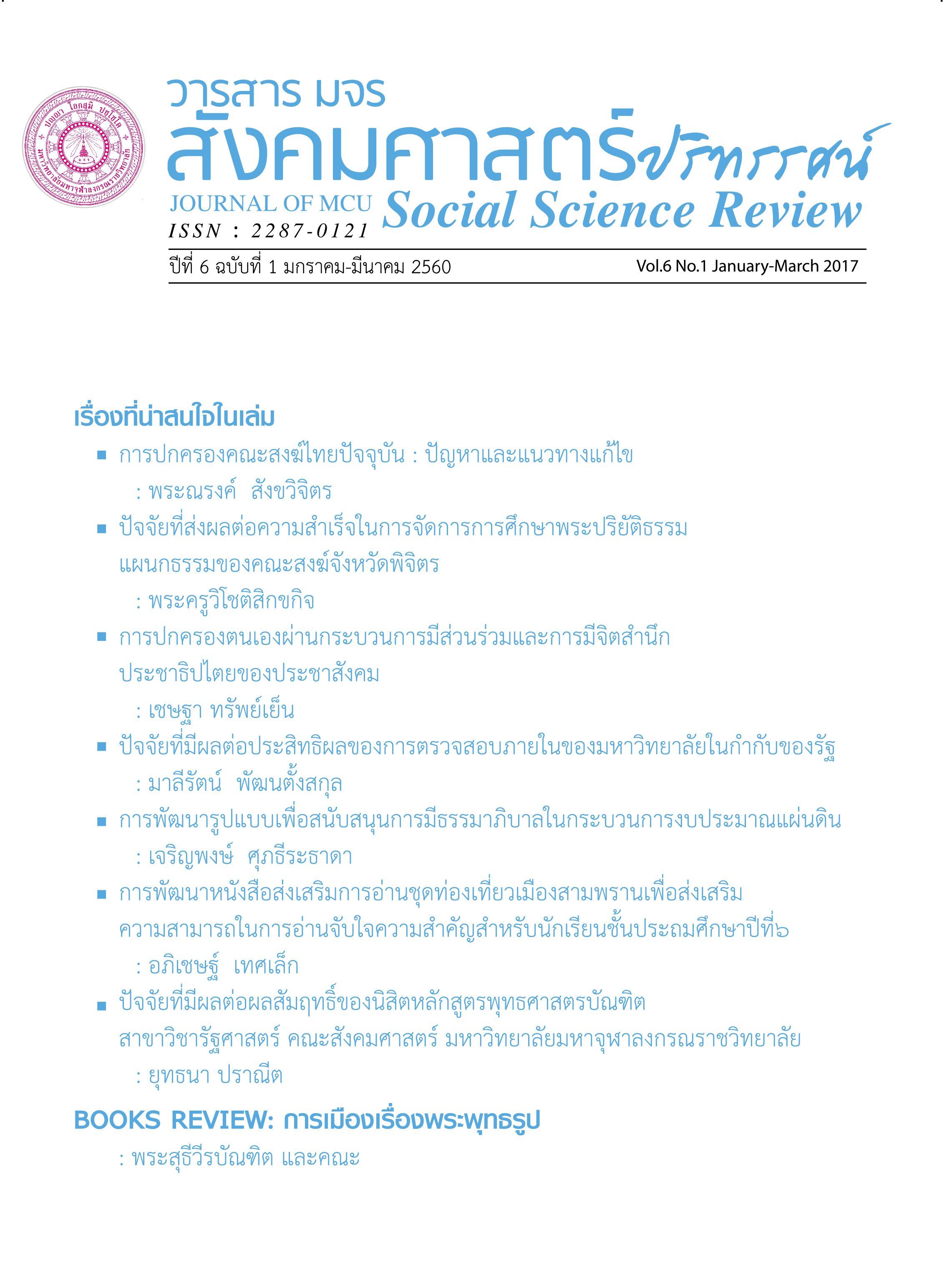ปัจจัยที่ส่งผลต่อความสำเร็จในการจัดการ การศึกษาพระปริยัติธรรม แผนกธรรมของคณะสงฆ์จังหวัดพิจิตร
คำสำคัญ:
ปัจจัยที่ส่งผลต่อความสำเร็จ การจัดการ การศึกษาพระปริยัติธรรมบทคัดย่อ
บทความวิจัยนี้มีวัตถุประสงค์ 1) เพื่อศึกษาสภาพทั่วไปและปัญหาอุปสรรค การจัดการศึกษาพระปริยัติธรรม แผนกธรรม 2) เพื่อศึกษาหลักพุทธธรรม แนวคิดและทฤษฎีที่เกี่ยวข้องกับการจัดการศึกษาพระปริยัติธรรม แผนกธรรม 3) เพื่อศึกษาปัจจัยที่ส่งผล ต่อความสาเร็จในการจัดการการศึกษาพระปริยัติธรรม แผนกธรรมของคณะสงฆ์จังหวัดพิจิตร การวิจัยครั้งนี้ เป็นการวิจัยแบบผสานวิธีทั้งเชิงคุณภาพและเชิงปริมาณ สาหรับ การวิจัยเชิงคุณภาพ ผู้วิจัยได้ศึกษาจากเอกสาร การสัมภาษณ์เชิงลึก ผู้ทรงคุณวุฒิ จานวน 19 รูป/คน และการสนทนากลุ่มเฉพาะ ผู้ทรงคุณวุฒิ จานวน 9 รูป/คน โดยการวิเคราะห์ข้อมูลแบบอรรถาธิบายและพรรณนาความ ส่วนการวิจัยเชิงปริมาณ ผู้วิจัยได้ใช้ข้อมูลจากกลุ่มตัวอย่าง จานวน 169 รูป/คนด้วยแบบสอบถาม วิเคราะห์ข้อมูลโดยใช้สถิติพรรณนาได้แก่ความถี่ ค่าร้อยละ ค่าเฉลี่ย และค่าเบี่ยงเบนมาตรฐาน ผลการวิจัยพบว่า 1. สภาพทั่วไปและปัญหาอุปสรรคการจัดการศึกษาพระปริยัติธรรม แผนกธรรม ได้แก่ ด้านบุคลากร คือครูอาจารย์ขาดความรู้ ขาดประสบการณ์ ไม่สามารถประยุกต์ใช้กับสภาพจริง ขาดการศึกษาอบรม ขาดขวัญและกาลังใจ สานักเรียนจะมีคุณภาพหรือไม่ก็ขึ้นอยู่กับบุคลากร ทุกฝ่าย ด้านงบประมาณ การเงินมีความสาคัญอย่างยิ่งต่อการเรียนการสอน เพื่อส่งเสริมกิจกรรมการเรียนการสอน เช่น อัตราค่าจ้างอาจารย์ประจา อาจารย์พิเศษ บุคลากรเจ้าหน้าที่ทุกแผนกรวมถึงการจัดซื้อจัดจ้าง การซ่อมบารุงรักษาวัสดุอุปกรณ์ ค่าน้าประปา ค่าไฟฟ้า ค่ารักษาความสะอาดและอื่นๆ ด้านวัสดุอุปกรณ์ ขาดวัสดุอุปกรณ์เพื่อส่งเสริมการศึกษานักธรรม คือสื่ออุปกรณ์การศึกษาที่จาเป็น เช่น หนังสือแบบเรียน ตาราเรียน คู่มือประกอบการศึกษา เครื่องใช้สอยภาย ในสานักเรียนและอื่นๆ ที่เกี่ยวข้องกับการศึกษาแผนกธรรม ด้านการจัดการ สาหรับจุดอ่อนขาดบุคลากรทั้งครูอาจารย์ เจ้าหน้าที่ และอื่นๆ อีกหลายประการที่เกี่ยวข้องกับโรงเรียนพระปริยัติธรรม แผนกธรรม เมื่อบุคลากรเริ่มมีจานวนน้อยลงๆ ก็ทาให้การเรียนการสอนต้องปรับกลยุทธ์ใหม่ ให้สอดคล้องกับปัจจุบัน 2. หลักพุทธธรรม แนวคิดและทฤษฎีที่เกี่ยวข้องกับการจัดการศึกษาพระปริยัติธรรม แผนกธรรม ได้แก่ อิทธิบาท คือฉันทะ ความพอใจในการทางานด้วยความรับผิดชอบ วิริยะ ความเพียรพยายามด้วยความอดทน จิตตะ ความเข้าใจสภาพแวดล้อมการเรียนการสอน วิมังสา การพิจารณากระบวนการเรียนการสอน แนวคิดที่เกี่ยวข้อง ได้แก่ ศิลปะการทางานให้สาเร็จโดยอาศัยบุคคลอื่น สาหรับทฤษฎีที่เกี่ยวข้อง ได้แก่ การวางแผน การจัดองค์การ การชี้นา และการควบคุม 3. ปัจจัยที่ส่งผลต่อความสาเร็จในการจัดการการศึกษาพระปริยัติธรรม ได้แก่ ด้านบุคลากร ด้านงบประมาณ ด้านวัสดุอุปกรณ์ ด้านการจัดการ นอกจากนั้น ผู้บริหารต้องส่งเสริมกระบวนการบริหารโรงเรียนพระปริยัติธรรมแผนกธรรมให้สอดคล้องตามนโยบายของแม่กองธรรมสนามหลวงได้แก่ ด้านการวางแผนเพื่อส่งเสริมการศึกษาแผนกธรรม ด้านการวางแผน ด้านการจัดองค์การ ด้านการชี้นา ด้านการควบคุม การจัดการศึกษาพระปริยัติธรรมตามหลักอิทธิบาท ได้แก่ ด้านฉันทะ ความพอใจรับผิดชอบ ผู้บริหารสนับสนุนการเรียนการสอนทั้งบุคคล การเงิน วัสดุอุปกรณ์ และการจัดการ เน้นนักเรียนมีศีลธรรม กตัญญูต่อสถาบัน ต่อครอบครัว ต่อตัวเอง ส่งเสริมให้ครูอาจารย์ใช้วิธีสอนจากความรู้และประสบการณ์ ด้านวิริยะ ความเพียรพยายาม ผู้บริหารสนับสนุนการศึกษาวิชาธรรมะเพื่อปรับใช้ในชีวิตประจาวัน กาหนดคณะกรรมการดูแลวิธีการฝึกอบรมครูอาจารย์ ส่งเสริมให้ครูอาจารย์เพิ่มพูนความรู้ความสามารถ ด้านจิตตะ ความตั้งใจ ผู้บริหารต้องมีความตั้งใจส่งเสริมและผลักดันการเรียนการสอนนักธรรมแก่ครูอาจารย์ และนักเรียน ด้านวิมังสา การพิจารณาแต่งตั้งคณะกรรมการปรับปรุงเทคนิคและวิธีการสอนให้เหมาะสมตามหลักสูตรนักธรรม โดยการจัดฝึกอบรม สัมมนาเทคนิคการเรียนการสอนนักธรรม
เอกสารอ้างอิง
Druck. Peter F. (2004). Management: Tasks Responsibility Practice. New York: Harper Row.
Herbert A. Simon, Donald W, Smithburg and Viotor A, Thompson. (2009). Public Administration. New York: Alfred A. Knope. Inc.
Herbert A. Simon. (2008). Administrative Behavior. New York: The Macmillan Company.
Herzberg. (2008). Melting Experiment. New Brunswick: New Jercy.
Michael E.McGill. (2010). Organization Development for Operating Managers.
New York: A Division of American Management Association.
Paul R.Lawrence. (2011). Developing Organization : Diagnosis and Action. Reading Mass: Addisonwesley Publising Co.
Phra Baidika Chaloemphon Thanuttaro (Phoprachum). (2559). The Development of Management Model of Pariyattidhamma Studies Dhamma Department Nakhonpathom Province. Journal of MCU Social Science Review, 5(2),
77 – 86.
Phrakhru Wisutthananthakhun. (2559). Dhamma Educational Administration of Sangha In Photharam District, Ratchaburi Province. Journal of MCU Social Science Review, 5(2), 15 - 30.
Phrakrusuwanvarakarn (Pimsab Buddhayano). (2557). Administration Development of Religion Study, Dhamma Study Section, of Sangha Administration, Region 1 (Doctoral Dissertation). Bangkok: Mahachulalongkorn
rajavathayalaya University.
Phramaha Amnart Pavattano. (2556). Phrapariyattidhamma Study Model Development (Doctoral Dissertation). Bangkok: Mahachulalongkorn-
rajavathayalaya University.
Phramaha Sombat Tanapanyo. (2557). Buddhist Strategy for Phrapriyattidhamma, General Education Section School Administration (Doctoral Dissertation). Bangkok: Mahachulalongkornrajavathayalaya University.
Phramaha Udorn Uttaro. (2557). Operational Competency of Teachers of Phrayariyattidhamma School, Pali Section in Line with Kalayanamitr. (Doctoral Dissertation). Bangkok: Mahachulalongkornrajavathayalaya University.
Price. Alan. (2004). Human Resource Management. In a Business Context.
London: Thomson Learning.
Religious Department. (2552). Dhammasuksac Chan Ake (First Grade Dhamma Studies). Bangkok: Coompertives of Thailand Printing.
Robbins Stephen. (2002). Management. New Jersey: prentice Hall International.
Sanya Sanyavivat (2550). Buddhist Method administration. Bangkok: Chulalongkorn University Press.
Stewart Black. (2009). Journal of Organization Change Management. Reading
Mass: Addisonwesley Publising Co.
Thongchai Chorpakar. (2551). Student Affaires administration. Pitsanulok: Shavittayalai Buddhachinnarat.
Warren Bennis. (2013). Organization Development. Reading Mass: Addisonwesley Publising Co.
ดาวน์โหลด
เผยแพร่แล้ว
รูปแบบการอ้างอิง
ฉบับ
ประเภทบทความ
สัญญาอนุญาต
ลิขสิทธิ์ (c) 2018 วารสาร มจร สังคมศาสตร์ปริทรรศน์

อนุญาตภายใต้เงื่อนไข Creative Commons Attribution-NonCommercial-NoDerivatives 4.0 International License.
เพื่อให้เป็นไปตามกฎหมายลิขสิทธิ์ ผู้นิพนธ์ทุกท่านต้องลงลายมือชื่อในแบบฟอร์มใบมอบลิขสิทธิ์บทความให้แก่วารสารฯ พร้อมกับบทความต้นฉบับที่ได้แก้ไขครั้งสุดท้าย นอกจากนี้ ผู้นิพนธ์ทุกท่านต้องยืนยันว่าบทความต้นฉบับที่ส่งมาตีพิมพ์นั้น ได้ส่งมาตีพิมพ์เฉพาะในวารสาร มจร สังคมศาสตร์ปริทรรศน์ เพียงแห่งเดียวเท่านั้น หากมีการใช้ภาพหรือตารางหรือเนื้อหาอื่นๆ ของผู้นิพนธ์อื่นที่ปรากฏในสิ่งตีพิมพ์อื่นมาแล้ว ผู้นิพนธ์ต้องขออนุญาตเจ้าของลิขสิทธิ์ก่อน พร้อมทั้งแสดงหนังสือที่ได้รับการยินยอมต่อบรรณาธิการ ก่อนที่บทความจะได้รับการตีพิมพ์ หากไม่เป็นไปตามข้อกำหนดเบื้องต้น ทางวารสารจะถอดบทความของท่านออกโดยไม่มีข้อยกเว้นใดๆ ทั้งสิ้น





